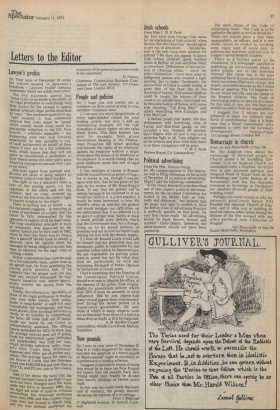Lawyer's profits
Sir: Your issue of December 28 under the column headed 'A Spectator's Notebook — Lawyers' Profits' contains statements which are wildly inaccurate.
The first statement asserts that "What is also in no doubt is the ability of the legal profession to overcharge with little chance for the layman to appeal against arbitrary legal profits described 'costs'." The statement goes on to say 'until recently it was commonly believed that costs might be 'taxed' Which usually meant some small but perceptible reduction in the bill. Now lawyers — solicitors especially — are dispensing with this nod towards impartiality by only agreeing to outof-court settlements on behalf of their Clients if they are on a full indemnity basis, which means that they will not agree to recommend. a settlement to their clients unless the other party pays whatever outrageous amount they care to set down." Solicitors (apart from licensed taxidrivers) are alone in being subject to statutory control over their charges. The right to tax a solicitor's costs is that of the paying party, i.e. the oPponent or the client and not the solicitor, and no costs received by solicitors are free from the client's right to require taxation by the Court. There is nothing new or recent — as the statement suggests — in requiring as a term of settlement of a claim, that the client be fully indemnified by the oPponent in respect of all his legal costs. The long established principle of such an indemnity was approved by Mr Justice Salmon (as he then was) in 1963, when he held that there was no reason why a plaintiff should have to accept a discount upon his rightful claim for damages by being obliged to accept less than an idemnity for his legal costs of settling a claim. In fact, a stipulation that costs be paid on a full indemnity basis, rather than as an agreed sum, far from penalising the Paying party protects him. If he suspects that the proper costs are less than any amount demanded, he may require taxation and, where appropriate, recover the excess from the solicitors.
Finally, the reference to "the ability of those of the legal profession to feather their own nests mainly from Public funds, is remarkable" is itself not only 'remarkable but 'outrageous,' and once more shows tither an equal reticence to check, or an inability to comprehend, the facts. All costs paid out of public funds are taxed by the Court or
independently assessed. The official
figures published for 1973/74 show that the average amount paid out of public funds for matrimonial cases (defended
and undefended) was £125 Per case, Which includes solicitors' costs, coun
sel's fees, Court fees, witnesses' expenses and other out-of-pocket payments. The average figure for cases in the House of Lords and the Supreme Court was £145 (£30 less per case than in
1972/73), and £71 per case in the County Courts Add to the above the facts that the current itemised costs in the High Court have not been changed since the scale came into force in January 1960; that the legal aid scale of costs in criminal Proceedings has remained unaltered since June 19&J, and that County Court costs were last revised in March 1970, and you may perhaps appretiate the
nonsence of the general assertions made in the statement.
D. Napley Chairman, Contentious Business Committee of The Law Society, 113 Chancery Lane, London WC2


























 Previous page
Previous page